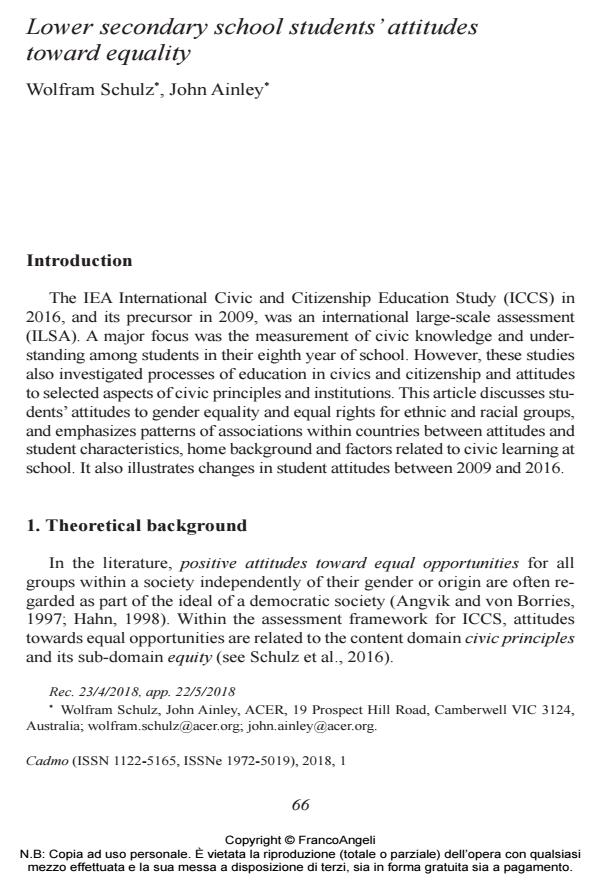Lower secondary school students’ attitudes toward equality
Journal title CADMO
Author/s Wolfram Schulz, John Ainley
Publishing Year 2018 Issue 2018/1
Language English Pages 16 P. 66-81 File size 219 KB
DOI 10.3280/CAD2018-001008
DOI is like a bar code for intellectual property: to have more infomation
click here
Below, you can see the article first page
If you want to buy this article in PDF format, you can do it, following the instructions to buy download credits

FrancoAngeli is member of Publishers International Linking Association, Inc (PILA), a not-for-profit association which run the CrossRef service enabling links to and from online scholarly content.
The IEA International Civic and Citizenship Education Study (ICCS) investigated outcomes and processes of civic and citizenship education in 2016 (Schulz et al, 2017) and 2009 (Schulz et al., 2010). In addition to investigating students’ knowledge and understanding of civics and citizenship those studies also studied attitudes regarding the importance of various principles underlying societies and communities, attitudes that students hold toward civic institutions and society, and perceptions of civic groups, institutions, and sources of information. This article discusses ICCS results regarding students’ attitudes to gender equality and equal rights for ethnic and racial groups. It describes the strength of these attitudes in 2016, changes since 2009, and associations with student characteristics, social interactions at home and factors related to civic learning at school. Results suggest generally strong endorsement of equal opportunities for males and females, as well as ethnic and racial groups, but with considerable variation across countries. Factors associated with civic learning, in particular civic knowledge, were positively associated with endorsement of equal opportunities. Furthermore, the findings suggest associations of these attitudes with school climate factors as well as background and engagement.
Keywords: IEA ICCS; civic learning; students’ attitudes; equality; school climate.
- Angvik, M., von Borries, B. (eds) (1997), Youth and History: A Comparative European Survey on Historical Consciousness and Political Attitudes among Adolescents. Hamburg: Korber-Stiftung, Vol. A-B.
- Barber, C., Torney-Purta, J. (2009, reissued 2012), “Gender Differences in Political Efficacy and Attitudes to Women’s Rights Influenced by National and School Contexts: Analysis for the IEA Civic Education Study”, in D. Baker, A. Wiseman (eds), International Perspectives on Education and Society, Vol. 10: Gender Equality and Education from International and Comparative Perspectives. Bing ley (UK): JAI/Emerald Group Publishing, pp. 357-394.
- Chong, A., Ñopo, H. (2007), Discrimination in Latin America: An Elephant in the Room? (Research Department Working Paper 614). Washington (DC): Inter-American Development Bank.
- European Commission (2012), Discrimination in the EU in 2012: Report on Euro barometer 393, -- retrieved from http://ec.europa.eu/public_opinion/archives/ebs/ebs_393_en.pdf.
- Hahn, C. (1998), Becoming Political: Comparative Perspectives on Citizenship Education. Albany (NY): State University of New York Press.
- Ñopo, H., Chong, A., Moro, A. (eds) (2010), Discrimination in Latin America: An Economic Perspective. Washington (DC): Inter-American Development Bank.
- Rasch, G. (1960), Probabilistic Models for Some Intelligence and Attainment Tests. Copenhagen: Nielsen & Lydiche.
- Schulz, W. (2015), “A Question of Perspective? Measuring Views on Equal Rights and Opportunities among Minority Groups in European Large-scale Surveys”, in M.M. Isac (ed), Tolerance through Education. Mapping the Determinants of Young People’s Attitudes towards Equal rights for Immigrants and Ethnic/Racial Minorities in Europe. Luxembourg: Publications Office of the European Union, pp. 58-72.
- Schulz, W., Ainley, J., Fraillon, J., Kerr, D., Losito, B. (2010), ICCS 2009 International Report. Civic Knowledge, Attitudes and Engagement among Lower Secondary School Students in Thirty-eight Countries. Amsterdam (The Netherlands): International Association for the Evaluation of Educational Achievement (IEA).
- Schulz, W., Ainley, J., Fraillon, J., Losito, B., Agrusti, G. (2016), IEA International Civic and Citizenship Education Study 2016. Assessment Framework. Amsterdam (The Netherlands): International Association for the Evaluation of Educational Achievement (IEA).
- Schulz, W., Ainley, J., Fraillon, J., Losito, B., Agrusti, G., Friedman, T. (2017), Becoming Citizens in a Changing World. The International Civic and Citizenship Education Study 2016 International Report. Amsterdam (The Netherlands): International Association for the Evaluation of Educational Achievement (IEA).
- IEA International Civic and Citizenship Education Study 2022 Assessment Framework Wolfram Schulz, Julian Fraillon, Bruno Losito, Gabriella Agrusti, John Ainley, Valeria Damiani, Tim Friedman, pp.39 (ISBN:978-3-031-20112-7)
- Education for Citizenship in Times of Global Challenge Wolfram Schulz, John Ainley, Julian Fraillon, Bruno Losito, Gabriella Agrusti, Valeria Damiani, Tim Friedman, pp.123 (ISBN:978-3-031-65602-6)
- IEA International Civic and Citizenship Education Study 2022 Assessment Framework Wolfram Schulz, Julian Fraillon, Bruno Losito, Gabriella Agrusti, John Ainley, Valeria Damiani, Tim Friedman, pp.61 (ISBN:978-3-031-20112-7)
Wolfram Schulz, John Ainley, Lower secondary school students’ attitudes toward equality in "CADMO" 1/2018, pp 66-81, DOI: 10.3280/CAD2018-001008